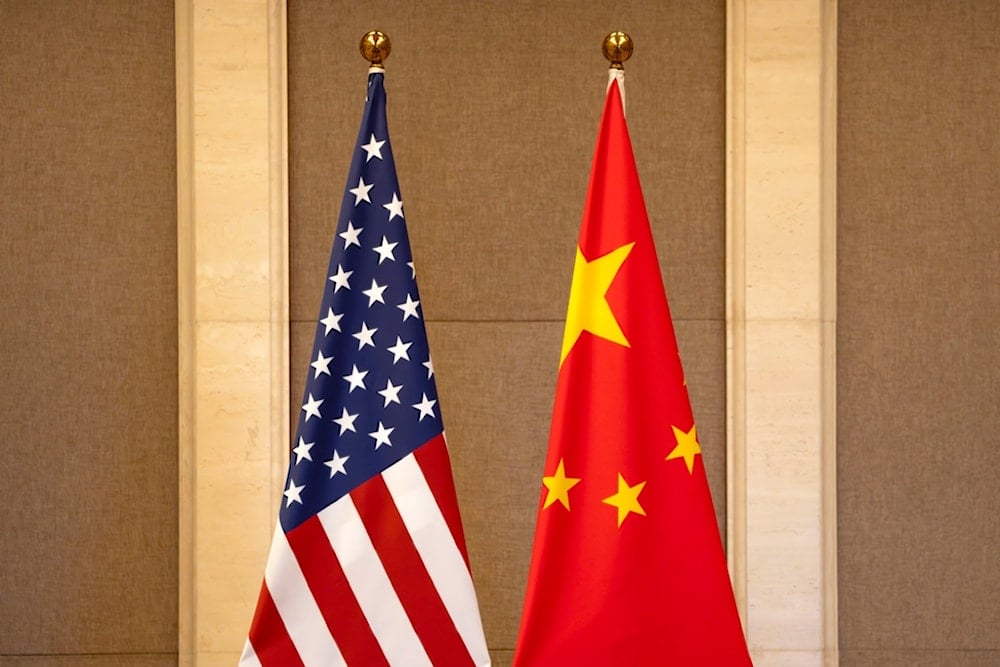Congress to vote on expanded limits to US investments in China
China's Foreign Ministry criticized the proposed measures, describing them as "artificial obstacles" to normal economic and trade exchanges.
-

US and Chinese flags are set up at the Diaoyutai State Guesthouse in Beijing, on July 8, 2023 (AP)
The US Congress is scheduled to vote in the coming days on legislation that would impose restrictions on American investments in China, as part of a broader spending bill to fund government operations through mid-March, Reuters reported on Wednesday, citing lawmakers.
In October, the US Treasury Department finalized regulations, effective January 2, limiting US investments in artificial intelligence and other critical technology sectors in China that allegedly pose risks to US national security.
The new bill expands on these measures, introducing additional provisions addressing concerns related to China. This includes a mandate to assess national security risks allegedly posed by Chinese-made consumer routers and modems, as well as a requirement for reviews of Chinese real estate acquisitions near sensitive national security sites.
"China is an economic adversary and we must take bold action to safeguard our future against the Chinese Communist Party," stated Democratic Senator Bob Casey.
He indicated that "this legislation takes bold action to restrict U.S. investments to stop our national security technology from getting into the hands of our adversaries before they can use it against us."
In response, China's Foreign Ministry criticized the proposed measures, describing them as "artificial obstacles" to normal economic and trade exchanges that disrupt global industrial and supply chain stability, to the detriment of all parties involved.
Ministry spokesperson Lin Jian urged US politicians to cease politicizing and weaponizing economic and trade issues and instead focus on fostering conditions for mutual cooperation between the two nations.
The bill also mandates that the US Federal Communications Commission (FCC) publish a list of entities with FCC licenses or authorizations that are partially owned by foreign adversarial governments, including China, ensuring that the commission is aware of any potential foreign influence within telecommunications and technology sectors.
Reuters pointed out that the US is intensifying its efforts to restrict Chinese products across various sectors. A forthcoming defense bill may prohibit China-based companies, such as DJI and Autel Robotics, from selling new drones in the US market.
Meanwhile, the US Commerce Department is finalizing regulations that would block Chinese automakers from selling vehicles in the US and restrict China Telecom's operations on US soil.
Lawmakers have also raised concerns about American index providers directing billions of dollars from US investors into Chinese companies allegedly supporting the development of China's military capabilities.
The Treasury Department's regulations and the new legislation specifically target sectors such as semiconductors, microelectronics, quantum information technologies, and certain AI systems, aiming to prevent US investments in technologies critical to China's military, including advanced code-breaking systems and next-generation fighter jets.
"For years I have watched American dollars and intellectual property fuel the Chinese Communist Party's technology and capabilities," said Representative Rosa DeLauro, the leading Democrat on the House Appropriations Committee.
She indicated that "this legislation builds on the regulations put into place this year by the Biden Administration, and sets the stage for continued bipartisan efforts to protect and rebuild our critical national capabilities."
Additionally, the outbound investment legislation builds on the technologies outlined in the Treasury order, incorporating additional AI models utilizing specific semiconductors, AI systems tailored for exclusive military or government surveillance purposes, hypersonic systems, and other export-controlled technologies.
Read more: China retaliates, bans export of critical microchip elements to US

 4 Min Read
4 Min Read








